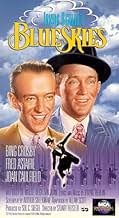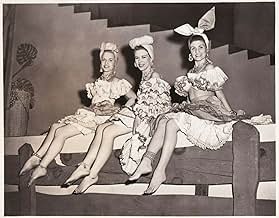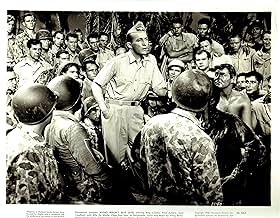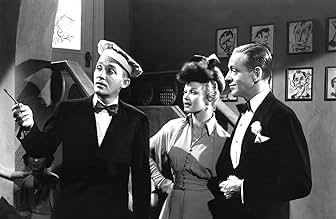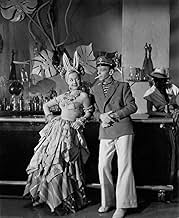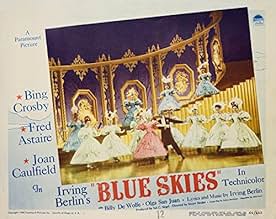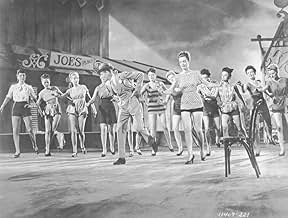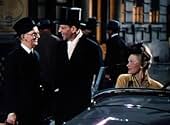Ajouter une intrigue dans votre langueAn ex-dancer and New York radio star narrates his love story for a band singer who loved a self-centered man who was unable to commit to his nightclub business or his family.An ex-dancer and New York radio star narrates his love story for a band singer who loved a self-centered man who was unable to commit to his nightclub business or his family.An ex-dancer and New York radio star narrates his love story for a band singer who loved a self-centered man who was unable to commit to his nightclub business or his family.
- Réalisation
- Scénario
- Casting principal
- Nommé pour 2 Oscars
- 3 victoires et 3 nominations au total
- Dancer
- (non crédité)
- Dolly
- (non crédité)
- Dancer
- (non crédité)
- Flapper
- (non crédité)
- Dancer
- (non crédité)
- Restaurant Patron
- (non crédité)
- Dancer
- (non crédité)
- Dancer
- (non crédité)
- Showgirl
- (non crédité)
Avis à la une
And there's the added treat of music by one of the legendary composers. Irving Berlin provides his beautiful songs, including the Oscar-nominee "You Keep Coming Back Like a Song." Fred Astaire does his famous "Puttin on the Ritz" number, while Bing sings the title tune. The duo work well together as they did on "Holiday Inn" four years earlier.
Billy De Wolfe has some funny moments in songs and sketches.
Overall, a colorful and entertaining musical. Don't listen to those who'd turn you away just because the plot is kinda thin.
What more could you want?
It seems that the three are Vaudeville friends. Fred is head-over-heels for Joan--and Joan is in love with Bing (who is reasonably indifferent for a while). Eventually, Bing and Joan marry--and you see VERY little of Fred through much of the rest of the film. It's a shame, as I really watched this movie for him more than anything else. Eventually, the new marriage goes on the rocks because Bing is too focused on success--much to the detriment of family life. Can these folks somehow make a go of it? Now considering it's a Hollywood film, I'd say the chances are pretty great they will--though if these were real people, you'd advise to Joan to get a divorce and be done with the louse! And what about poor Fred?! What will happen with this really swell guy? Well, what REALLY happens took me aback--as it appears as if she got BOTH of them by the end of the movie! "Blue Skies" is a film weighted very heavily towards singing and Crosby's talents. So, if you love his singing, the film will no doubt be more enjoyable--especially when he sings an abbreviated version of "White Christmas" (who could dislike that?!). However, I do think the film has one or two too many musical numbers and could have used from a bit more plot. As for me, seeing Fred get to play the #3 man and only dance a bit was sad--though his number "Putting on the Ritz" was terrific. One or two more of his numbers might have made the film a bit better. As for the story, it's pretty clichéd but enjoyable. A decent film but it could have been better--particularly if they'd made Bing's character more likable.
Bing and Fred play the same type roles in this as in Holiday Inn. Fred's the ambitious partner of an act who wants to get to the top of the show business ladder. Bing just wants to work at the trade and go through life with the least responsibility possible. Of course they fall for the same girl as in Holiday Inn and at Paramount in the 1940s who do you think winds up with the girl?
But the real star of this film is the music of Irving Berlin. This time Paramount gave Crosby and Astaire technicolor and it's put to good use with some great numbers. Astaire does two classic dance numbers with Putting on the Ritz and Heat Wave. Crosby gets two big budget numbers with Everybody Step and C-U-B-A, the latter nicely paired with Olga San Juan.
Previous reviewers found Joan Caulfield as the object of affections performance weak. Maybe so, but she's following a trend of Crosby leading ladies who are nice girls swept up by the Crosby song and charm. It wasn't until Jane Wyman did those two films with Bing that he got a leading lady with real spirit. Sometimes Bing didn't even get the girl.
The hit song here was You Keep Coming Back Like A Song which was a recurring theme. It got Oscar nominated, but lost to Judy Garland's train excursion On the Atchison, Topeka, and the Santa Fe.
Billy DeWolfe also does a nice comic turn and we get his famous Mrs. Mergitroid act which he did in nightclubs.
Though the plot is thin who cares when you can see Bing Crosby and Fred Astaire at their very best.
In common tradition to many 1940s movies, most commonly found in the "film noir" genre, BLUE SKIES is told in flashback, starting in modern day setting at a radio station, Broadcast Network of America in New York City's Rockefeller Center, where Jed Potter (Fred Astaire), a former dancer now a radio personality, relates his life story and career to his listeners, a story with a beginning but without a finish. Dating back circa 1919 following World War I finds Jed attracted to Mary O'Hara (Joan Caulfield), a girl, a "very pretty girl," working in the chorus. He invites her to accompany him for dinner at a night club owned by Johnny Aams (Bing Crosby), his Army buddy. Almost immediately, Mary is attracted to Johnny, but in spite of Jed's warning that Johnny is not the marrying kind, she cannot resist him. Johnny and Mary marry, and during their union have a daughter, Mary Elizabeth (Karolyn Grimes). All goes well until Mary finds that Jed is right in his assumption of Johnny being selfish and unstable, buying and selling nightclubs (oneof them called "Top Hat") at a moment's notice, and unable to settle down at in one place they could call home. After their divorce, Mary becomes engaged to Jed. Finding she's unable to marry Jed, Mary disappears, leaving Johnny as well as Jed, through his narration, to wonder whatever became of her.
As Jed Potter relates his "album of Irving Berlin songs" to his radio listeners, movie viewers get to to be treated to see and hear such classic tunes including: "A Pretty Girl is Like a Melody" (sung by chorus, danced by Fred Astaire); "I've Got My Captain Watching for Me Now" (Sung by Bing Crosby); "You'd Be Surprised" (sung by Olga San Juan); "All By Myself" (Crosby); "Serenade to an Old-Fashioned Girl" (sung by Joan Caulfield); "Puttin' on the Ritz" (Astaire); "I'll See You in C.U.B.A." (Crosby); "A Couple of Song and Dance Men" (Astaire and Crosby); "You Keep Coming Back Like a Song" (Crosby); "Always" (chorus); "Blue Skies," "The Little Things in Life," "Not for All the Rice in China" (all sung by Crosby); "Russian Lullaby" (Chorus); "Everybody Step" (Crosby); "How Deep is the Ocean" (chorus); "Running Around in Circles" (Crosby); "Heat Wave" (sung by Olga San Juan/danced by Astaire); "Buy Bonds Today" "This is the Army" "White Christmas" and "You Keep Coming Back Like a Song" (all sung by Crosby). "Mandy" and "Some Sunny Day" are those other songs heard as background music.
Astaire's "Puttin' on the Ritz" number, where he dances to eight images of himself, is one of the great highlights. First introduced by Harry Richman for the 1930 musical, PUTTIN' ON THE RITZ, the original lyrics have been changed to fit the Astaire style as well as the changing of times. Crosby and Astaire also provide fine moments with their joint collaboration as "A Couple of Song and Dance Men." Billy De Wolfe supplies much of the comedy relief as Johnny's partner and assistant. Aside from being the love interest to Olga San Juan, he does a five minute one man comedy routine as Mrs. Murgatroyd.
While the story tends to get corny at times, it does get better with its passage of time and its assortment of fine songs. Aside from Crosby's singing, his sentimental moment where he meets with his little girl (Grimes) again is well done, along with Astaire's dancing, which is always first rate. He briefly breaks away from his traditional character where he becomes a troubled dancer who turns to liquor after being jilted. Legend has it that BLUE SKIES was originally intended to become Astaire's farewell movie. Fortunately, after his two year retirement, he was lured back to the screen for more musicals, dramas and everything else through 1981. Joan Caulfield, then new to the movies, would work again with Crosby in WELCOME STRANGER (1947), an underrated drama with songs. Crosby and Astaire wouldn't work together again until being reunited again for their TV special, "A Couple of Song and Dance Men" (CBS, 1974)
Formerly presented on American Movie Classics (1994-1999) and later Turner Classic Movies (where it premiered February 18, 2007), BLUE SKIES, distributed on video cassette in 1997, is also available on a DVD package double featured with Crosby's other musical, BIRTH OF THE BLUES (1941). Although BLUE SKIES is not as memorable as HOLIDAY INN, they can be summed up as being two different movies with similar storyline as well as the memory of all that. (***1/2)
The story of this love triangle is backed up by one Irving Berlin song after another - there is a lot of music, some fine singing by Crosby and tremendous dancing by Astaire. This was to be his last film but his retirement only lasted a couple of years. He worked in film until 1977 and continued working in television and doing voiceovers until 1981; he died in 1987. In the late '50s, he did two dance specials on television, and he did one in 1968. Was he dancing at the age of 69? Probably.
The movie doesn't really hang together. The production values are great, but the story is trite, and there aren't enough fabulous numbers. Astaire does "Puttin' on the Ritz," which is the height of the film, also "Heat Wave," and with Crosby, "A Couple of Song and Dance Men." There is a section during World War II where Crosby sings some of his Berlin standards, "This is the Army, Mr. Jones," "White Christmas," and "Any Bonds Today?" The beautiful "Always" is done as a chorus number, as is "How Deep is the Ocean," with Crosby sometimes singing along.
Having heard Crosby when he had something to prove back in the early '30s, I can never be content with his crooning, except perhaps in some parts of "Holiday Inn." Astaire is the one who makes this film worthwhile at all. See it for him and for some of the music and musical numbers. Ignore the story.
Le saviez-vous
- AnecdotesAfter Fred Astaire announced his retirement before completing this film, New York's Paramount Theater generated a petition of 10,000 names to persuade him to come out of retirement.
- GaffesAt the beginning of the movie, which is just after World War I, the Crosby character tells the De Wolfe character to do his Frankenstein routine. The Frankenstein character he does is based on Boris Karloff's 1931 version which some ten years or so in the future. At that time in the movie Frankenstein was just a creature in Mary Shelly's book.
- Citations
Jed Potter: Song and Dance Man.
Johnny Adams: Song and Dance Man, that's right.
Jed Potter: He didn't remember it then, how could he know it now?
Johnny Adams: Oh, get out, I bet I could do it right now, the whole thing.
- ConnexionsFeatured in The Dick Cavett Show: Fred Astaire (1970)
- Bandes originalesA Pretty Girl Is Like a Melody
Words and Music by Irving Berlin (1919)
Sung by Fred Astaire
Danced by Fred Astaire, Joan Caulfield, chorus
Meilleurs choix
- How long is Blue Skies?Alimenté par Alexa
Détails
- Date de sortie
- Pays d’origine
- Langues
- Aussi connu sous le nom de
- Blue Skies
- Lieux de tournage
- Société de production
- Voir plus de crédits d'entreprise sur IMDbPro
Box-office
- Budget
- 3 000 000 $US (estimé)
- Durée1 heure 39 minutes
- Rapport de forme
- 1.37 : 1


